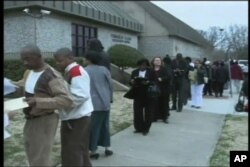Globally there are 620 million economically active young people under the age of 24, but the unemployment rate among them is the largest ever recorded by the International Labor Organization. One of the hardest hit areas is Europe. Spain is still suffering from some of the highest unemployment among the young - it is a staggering 40 percent this year, leading to some job seekers to give up looking for work.
"I am very down," says a young man who move to Spain 10 years ago from Ecuador. "And this looks like it doesn't have any solution, and even if it does, perhaps not for six or seven years. The way things are going, we foreigners will have to leave here, and even Spaniards are leaving."
The United States is not immune to this labor crisis. A U.S. government agency reports the number of young people who were employed in July was the lowest rate on record for the month of July.
"What it's showing is we have very over qualified people, at an older age, that are taking jobs that normally would have gone to many young people," says U.S. Secretary of Labor Hilda Solis. "This recession has really hurt the ability for young people to get into the job force."
Lyle Stewart is one example. A student at University of Maryland, Stewart has a job. But his friends aren't so lucky.
"A lot of the more mature people come down and snatch up the jobs," says Stewart. When asked why that's happening, Stewart opines: "Because there's less jobs out there that are high paying and people need money to survive. I completely understand that, but it just makes it more difficult on the youth to get jobs."
But not all is gloom and doom. At the University of Maryland's career center, director Rick Hearin says most students can get placed in jobs they want if they are aggressive.
"Generally, if kids have a pretty good idea of what they want to do, and if they're aggressive about going through the job search process, they're probably going to be okay. It's those students who are the proverbial 'lost souls' who lack direction, or sometimes lack motivation (or) don't take advantage of the rich resources that career centers like University of Maryland provide."
Hearin adds that when students cannot find work in their field in a bad economy, finding work when the economy improves can be even harder.
"Because there's a whole fresh crop of brand new graduates who have kind of gone to the head of the line, and at the same time that's happened, experienced job seekers are picking off the plums as well, so it's very important students 'turn on the after burners' and complete their senior year and go after what they want."
When it comes to hiring, companies remain cautious and pragmatic, according to Michael Steinitz, who works for the recruiting firm Robert Half International. But he says there are glimmers of hope.
"The good news is that companies did cut so deep, hiring is coming back. They are already showing to be pretty aggressive," he says. "And even though you sort of hear these feelings of sort of in newspaper, signs of pessimism sometimes, hiring has picked up."
The International Labor Organization says it is important for countries to focus on training and education policies that target employment for the young. Not doing so, warns the I-L-O, could create what the I-L-O calls a "lost generation" of workers.
You can watch all of Philip's "Money In Motion" reports by clicking here.




